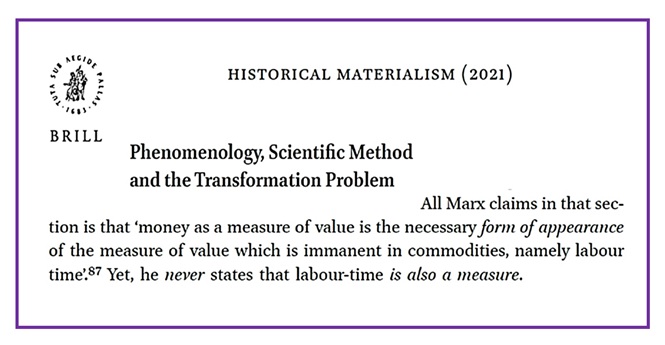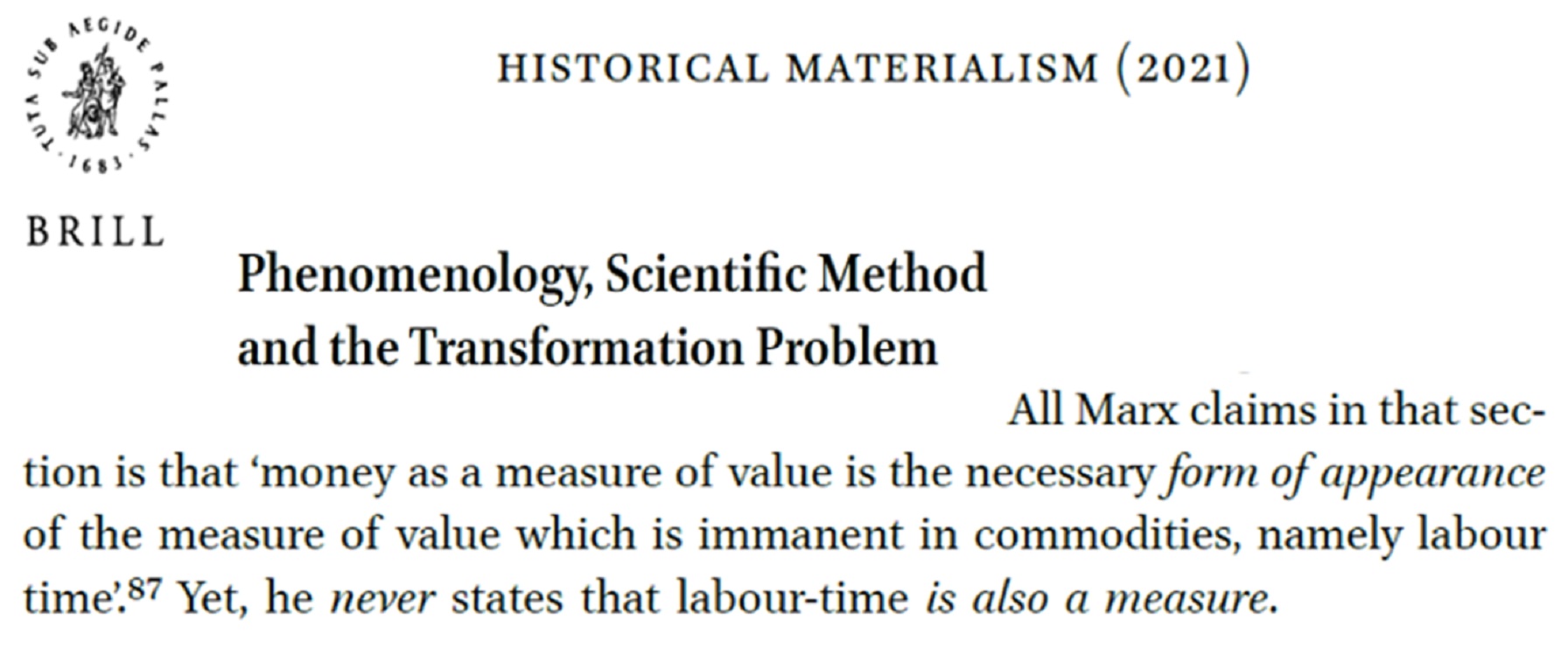
by Andrew Kliman
Last week, in a With Sober Senses article, “Value, Price & Prattle: A Response to Lopes, Byron, and Historical Materialism,” I asked Historical Materialism and its publisher (Brill) to retract a paper, by Jesse Lopes and Chris Byron, that was published in a recent issue of the journal. In support of this request, my article showed that the Lopes-Byron paper’s overall “argument and representation of Marx’s views were … fundamentally flawed and riddled with serious errors.” It also showed that they “misrepresented my arguments, disregarded or failed to understand the textual support I had provided for my interpretations, and seriously misunderstood the temporal single-system interpretation of the quantitative dimension of Marx’s value theory.”
There are many misrepresentations and errors in the Lopes-Byron paper.
This one is self-evident.
I was under no illusion that obtaining a retraction would be easy. As I noted in my article, “I fully expect that my request for retraction will be ignored or rejected by the editors and publisher of Historical Materialism.” Nevertheless, to make sure that Historical Materialism and Brill were aware of my request, I wrote the following message to each of them the day after my article appeared:
In an article published yesterday (https://marxisthumanistinitiative.org/economics/value-price-prattle-a-response-to-lopes-byron-and-historical-materialism.html), I request retraction of a paper published in _Historical Materialism_. I am reiterating the request now in messages to the journal’s editors and to Brill, the journal’s publisher.
My article documents instances in which the _Historical Materialism_ paper misrepresents what others have stated and instances in which it is inaccurate in other ways. Since my response to the paper deals with other matters as well, I will be happy to point out the places where it provides evidence of misrepresentation and inaccuracy.
I have not (yet) heard back from Brill. But I did hear back, almost immediately, from the editors of Historical Materialism. I had e-mailed my message to them on January 18, at 1:08 pm, EDT. At 3:13 pm, EDT, I received the following reply from “The Editors,” written and signed by the head honcho, Sebastian Budgen:
Dear Andrew Kliman,
We are not going to « retract » the article. But if you write a civil response and you don’t claim that people are making death threats against you etc, we will consider publishing it on the website.
Best
Sebastian
Note that Budgen did not ask me to point out my evidence of misrepresentation and inaccuracy, as I had offered to do. Note that he did not provide any defense of the Lopes-Byron paper. Note that he replied to me just 125 minutes after I sent my email (and less than 24 hours after my article was published)—which was far too little time to evaluate the evidence I had provided.
In short, my request that Historical Materialism retract the Lopes-Byron paper was not considered on its merits. Budgen’s response thus confirms, once again, what I stated in my article: “searching for and getting the truth is not a central commitment of the journal.”
Indeed, Historical Materialism’s lack of commitment to the truth is the underlying problem here. It is the reason Lopes and Bryon’s paper was published in the first place. As my article pointed out, “[i]t takes a ‘scholarly’ journal” to turn thoughts that were not ready for prime time “into a ‘scholarly contribution’ that has been peer-reviewed and deemed worthy of publication.”
In his essay On Bullshit, the philosopher Harry Frankfurt famously wrote that “[t]he bullshitter … does not reject the authority of the truth, as the liar does, and oppose himself to it. He pays no attention to it at all. By virtue of this, bullshit is a greater enemy of the truth than lies are.” It clearly seems that Historical Materialism is a bullshit journal, in Frankfurt’s sense of the term.
Sebastian Budgen
Budgen’s suggestion about publishing a response from me on the journal’s website is unacceptable for many reasons. The main reason is that the suggestion is clearly intended to prevent truth from triumphing over falsehood. Byron and Lopes would get to continue to say what they want, while the Historical Materialism crew would “consider” letting me say what I want. (And what about Marx? How can he defend himself against the misrepresentation of his statements and views?)
The end result would be, at best, a he-said / she-said stalemate in which “alternative facts” are deemed just as good as actual facts. Historical Materialism would face no consequences—it would not have to confess to its own wrongdoing, provide restitution, or even retract the Lopes-Byron paper. It would sweep an embarrassing situation under the rug and forestall the real solution. As I noted in my article, the real solution here is the building of a “pro-truth movement of opposition from the left to break their haughty power.”
Editor’s Note: If you wish to support a pro-truth movement regarding this matter, please contact MHI.




Andrew
I agree apart from a few quibbles with your defence of Marx’s quantitative solution as distinct from the interpretation of Lopes and Byron. But you fail to recognize that the editors of HM, especially Sebastian, do not take sides in these debates unless it concerns their own field of study and rightly so (in accord with their principles as outlined right at the beginning of their project). They provide a forum in which all sorts of stuff gets published with which I may agree or disagree. You disagree. Good but I would much prefer it if you took up Sebastian’s offer and wrote a piece for the journal containing the critique which you have very cogently presented above.
Peter,
I think that the call for a retraction stems not from the fact that the Lopez-Byron paper takes a different point of view in a debate, but rather stems from the fact that the article in question suffers from a total lack of scholarly standards. If HM’s standards ares so low that anyone can say anything, regardless of how outrageously untrue the statements are, then it has no basis for calling itself a journal… it may as well be Facebook. If all they do is to “provide a forum” in which anyone can say anything without any accountability then I see little difference between that and Facebook. When one reads a journal one expects that there is some standard of scholarship in place to prohibit the publishing of obvious falsehoods and contradictions.
Peter Green: publishing the same, or substantially the same, article in two different places–as you suggest that Kliman should do–is not generally regarded as ethical (unless the second publication of the article is explicitly called a republication and the original publication is cited).
Our editorial policy states that other publications “may link freely to the material on this website” but “not republish material unless you request and obtain our prior permission.” I suggest that Historical Materialism carry a link to Kliman’s article on its website. We will also consider permitting republication of the article if Historical Materialism makes a civil request.
Anne Jaclard, Editor of With Sober Senses
Peter,
You say that “you fail to recognize that the editors of HM, especially Sebastian, do not take sides in these debates,” but I do recognize that. As I said in my 1st article, and repeated above, “searching for and getting the truth is not a central commitment of the journal.”
Brendan Cooney made an important point above: I’m asking HM to retract the Lopes-Byron paper because of its misrepresentations and other falsehoods, NOT because I disagree with its point of view.
So you and I are saying the same thing. It’s just that, in your version, HM’s behavior somehow seems non-despicable.
What I don’t understand is: Why do you think it’s right not to take sides WHEN the sides are falsehood and truth?
For example, Lopes & Byron wrote, “All Marx claims in that section is that ‘money as a measure of value is the necessary *form of appearance* of the measure of value which is immanent in commodities, namely labour time’. Yet, he *never* states that labour-time *is also a measure*” Why is it right to publish, and not retract, this self-evident falsehood?
Another example. Lopes & Byron wrote, “Capitalists, we are told [by Marx, at the start of volume 3 of Capital], conflate cost-price with the true price of a commodity because they are not consciously aware of the unpaid labour (the surplus-value) that enters into the actual price of their product.” My article showed that this sentence contains 2 falsehoods (it also argues that these particular falsehoods are significant, but that’s another matter). So what makes it right to publish, and not retract, this?
Anne Jaclard explained above why it would be unethical for me to submit my article to HM. I also wouldn’t want to do so. Submitting to HM would be submission to HM. I’m not going to submit to their regime of untruth.
Peter,
you say “I agree apart from a few quibbles with your defence of Marx’s quantitative solution as distinct from the interpretation of Lopes and Byron.”
In the very next sentence you write “But you fail to recognize that the editors of HM, especially Sebastian, do not take sides in these debates unless it concerns their own field of study and rightly so …”
Can you clarify which is it? Are you committed to truth, or are you committed to “anything goes”?
Historical materialism has a big hint in its name: objectivity. Truth has an objective, verifiable, element that’s independent of one’s individual viewpoint. Concretely, this is the case of L&B’s article: quoting a sentence, but then claiming that the sentence says the exact opposite of what it actually says. That’s not open to opinion, it’s verifiably objective. In a similar vein, L&B’s article misrepresents the TSSI.
If you were to get back to me accusing me that my feelings have been hurt, you might do that. But that does not change the verifiably false claims that L&B make. Neither does the HM offer to Kliman, to present his view. In fact, Kliman would entertain intellectual immorality if he played at the level of “anything goes”.
So is HM like Facebook, as Brendan asks, or is it a scholarly journal? If it is the latter, there is only one option: retract L&B’s article.